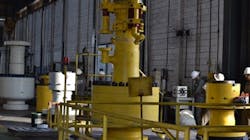ROG.e 2024: Three technology trends shaping Brazil’s energy future
By Marcio Robles, Oil States
The grit of global energy markets has been tested in recent years. Resilient and adaptable to a constant sea change of economic and regulatory shifts, the offshore industry is entering a new era of ESG initiatives and technology innovation.
To support the offshore industry’s progress, subsea solutions providers are bringing technology innovations forward that will transform the future of the oil and gas sector. Three trends are emerging that will impact where operators can prioritize investments and help the subsea market surge to meet growing energy demands in Brazil and globally.
1. Supporting the energy transition
As operators continue to recover and accelerate offshore exploration and production (E&P) activities, they must leverage advanced tools and techniques to make processes more reliable and efficient. The companies that power and fuel the world must also take the lead in making operations more cost effective and sustainable.
Technology solutions providers are at the forefront of this progress, applying decades of engineering capability to improve subsea equipment for both traditional and renewable energy applications. Operators stand to gain both cost savings and operational excellence by investing in enhanced technologies that support safer and more sustainable operations.
2. Investing in integrated solutions
In the subsea sector, technology manufacturers not only provide essential equipment to access energy, but they are also helping operators overcome challenges such as personnel shortages, manufacturing capacity and gaps in specialized capabilities and services.
- Reduced personnel and infrastructure: An integrated solutions provider with local presence and manufacturing capacity in Brazil can provide custom, purpose-built solutions to execute certain (or all) scopes of work as well as meet all requirements, norms and standards.
- Lack supply chain technical know-how: Collaborating with a global manufacturer with specialized knowledge of offshore environments means having direct access to deep engineering expertise and field-tested insights that consider all applicable environmental, regulatory and safety requirements, including offshore vessel rules and standards.
Operators that were forced to pull back or pause offshore E&P in the past several years can solve these short-term challenges by identifying a technology provider that can fully support supply chain solutions at the regional level.
For Brazil operations, this means leveraging a local, multidisciplinary, certified technical team with comprehensive inspection, intervention and installation capabilities, plus additional skilled services such as fabrication, specialized welding, cladding, testing, and segregated painting and blasting services.
These capabilities were crucial for the Oil States facility in Brazil recently to provide subsea jumper equipment to assist EPCI projects offshore. All equipment is serviced in-country with a local technical team based at an API Q1- and ISO 9001-certified facility in Macaé, resulting in time saved, reduced costs and increased safety.
3. Innovating for safety and sustainability
Combined with performance improvements, technology manufacturers are continuously innovating to make operations safer and more sustainable while advancing into the next energy frontier.
The Macaé facility recently developed an approach to move vertical connection modules using a customized tilted skid. Moving the vertical connection modules on pipelaying vessels is a complex and challenging task due to the large dimensions and weight of the equipment. Improper handling when using traditional methods that involve strapping and fastening devices with direct manual intervention would increase safety risks considerably. A tilted skid simplifies the process, eliminating the need for straps and avoiding improper positioning during operation. This technology innovation improves the stability of vertical connection modules during transport, optimizes handling time and reduces the risk of operational errors and injury.
As operators in Brazil seek to capitalize on production opportunities, access to skilled technicians and engineering expertise is critical. Solution providers that offer deep energy industry expertise, the technical capabilities and manufacturing capacity to successfully complete challenging projects as well as a flexible set of support services will be critical to the success of energy projects in this important market.
Oil States is exhibiting at booth A24 at ROG.e 2024 this week in Rio de Janeiro, Brazil.
About the Author

Marcio Robles
Marcio Robles is managing director at Oil States, Brasil. He leads the company’s performance and strategy in the oil and energy sector, and he has more than 18 years of experience in business development, management and subsea engineering.
Robles holds an MBA from Fundação Dom Cabral and a specialization in Innovation and Entrepreneurship from the University of Cambridge.
